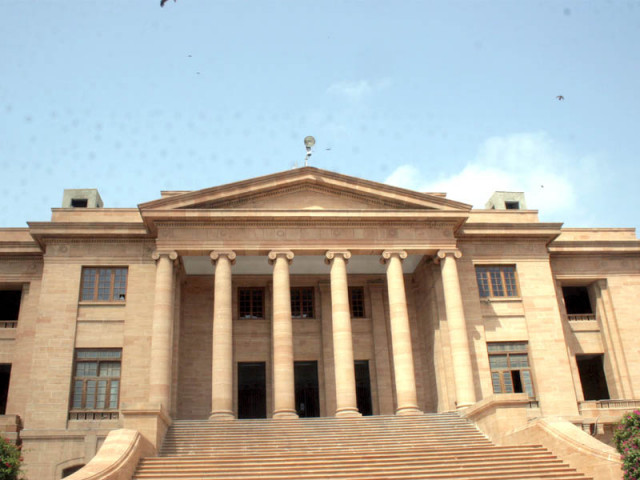SHC tells Sindh govt to finalise police law by May 14
Petition seeks contempt proceedings against CM for failing to implement court's orders

Sindh High Court PHOTO: EXPRESS
A two-member bench of the high court, comprising Justice Hassan Azhar Rizvi and Justice Mehmud A Khan, gave these directions while hearing a petition seeking contempt of court proceedings against the chief minister, chief secretary, Inspector-General of Police and other officials for delays in implementation of judicial orders on police reforms.
Advocate-General (AG) Sindh Salman Talibuddin informed the court that chief minister Murad Ali Shah has assured that a new police law and rules would be finalised within a month.
However, Faisal Siddiqui, counsel for the petitioner, Karamat Ali, maintained that assurances by the chief minister could no longer be relied upon in view of past experience. They have no intention to implement the court's orders, he said.
Justice Rizvi questioned why the Sindh government could not frame police rules along with the law despite availability of competent people in the provincial government.
"If the matter of framing the rules was referred to the Sindh Assembly, it would meet the same fate as in the case of other issues before it," said Justice Rizvi.
When the AG said that Sindh police chief was part of the committee formed to develop the draft law and rules of police, the petitioner's counsel said that even the IG could not defy the court's orders.
Barrister Siddiqui informed the court that former Sindh IG AD Khowaja had drafted the police rules three times and submitted these drafts with the Sindh government. He disclosed that a cabinet committee in its meetings on January 9 and March 22 reviewed the draft laws on police reforms prepared in light of the judicial orders.
However, this committee referring to a March 22, 2018 order of the apex court, refused to prepare a police law based on the SHC's order. This cabinet committee includes provincial ministers Imtiaz Sheikh and Shabbir Bajrani as well as home secretary Abdul Kabir Qazi as its members.
"Will the two ministers of Sindh government tell the high court what it should do?" questioned Barrister Siddiqui, adding that the Supreme Court had rejected the plea filed by the Government of Sindh challenging the SHC judgment.
During the proceedings on Friday, Salman Talibuddin and Faisal Siddiqui exchanged hot words amid heated arguments. Sindh Advocate-General said that Government of Sindh was legislating on police behind closed doors.
The petitioner had maintained that Sindh government wanted to make the proposed Police Act 2019 based on its own political compulsions and requirements and pleaded that cabinet committee members should be tried and punished for contempt of court.
Bail granted
Another bench of SHC, comprising Chief Justice Ahmed Ali Sheikh and Justice Omar Sial granted protective bail plea for seven days on a plea filed by Agha Siraj Durrani's front man, Gulzar Ahmed.
The petitioner's counsel argued that Gulzar Ahmed could not return to Pakistan within the given time due to illness therefore the bail plea should be accepted again.
The court accepted the protective bail plea of Gulzar Ahmed against the surety of Rs1 million. The petitioner's counsel Adnan Memon requested that the amount of surety was too high and should be reduced.
National Accountability Bureau's prosecutor argued that transactions worth Rs750 million have been made through the accused's account. Chief Justice remarked, "So what if the transaction of such a big amount has been made? These are very poor people -- the poor people who keep millions of rupees."
The court rejected the request to reduce the surety amount.
The petitioner's counsel had argued previously that his client was in America and he came to know about the inquiry through the news. Gulzar Ahmed wants to come back to Pakistan but he fears that he would be arrested.
Sentence commuted
A two-member-bench comprising Justice Naimatullah Phulpoto and Justice KK Agha rejected a plea seeking to set aside the death sentence awarded to a man in a case pertaining to the honour killing of his wife and two children.
The bench, however, reduced the death sentence awarded to convict Sher Muhammad due to the contradiction in statements given by witnesses.
According to the prosecution, the convict poisoned his wife, Minhas and two children, Hasnain and Alishba. He tried to prove the murder of his wife as a suicide. He was sentenced to death by the judicial magistrate East-V. The case against him was registered in 2012 at New Karachi industrial area police station on behalf of the deceased woman's brother.



















COMMENTS
Comments are moderated and generally will be posted if they are on-topic and not abusive.
For more information, please see our Comments FAQ